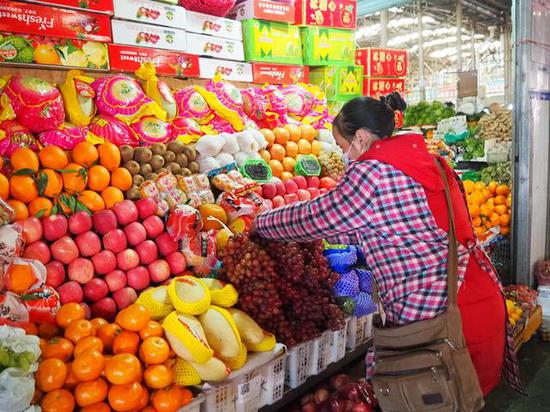
Staff organizes fruits for sale in Yaowangshan farmer's market in Lhasa, Southwest China's Tibet autonomous region. (Photo/Xinhua)
Tashi and his family have many more choices during their weekly grocery shopping nowadays.
"When I was a child, dumplings and canned food were my dream feast," the 70-year-old said on a recent Sunday while shopping in Lhasa, capital of the Tibet autonomous region.
Holding his grandson's hand and selecting edible oils from a supermarket shelf in Porgor Street, Tashi said, "I have so many choices just to buy cooking oil, including olive oil, walnut oil, rapeseed oil and so on."
In 1959, Tibet's total grain output was only about 180,000 metric tons. Last year, it was a record 1.07 million tons, topping 1 million tons for a seventh straight year.
At the Yaowangshan farm produce market, west of Lhasa's Potala Palace square, Yudron, 68, bought some asparagus.
"In past winters, when the New Year came, we had to stock up on vegetables in advance, mainly radishes, cabbages and potatoes," Yudron said. "Now, I buy whatever I want."
At another supermarket, Nyima selected avocados to make a nutritious breakfast. "Thanks to Tibet's booming express delivery sector in recent years, we have more varied fruit choices such as durian, mangosteen and loquat," he said.
Express delivery enterprises in Tibet handled 14.85 million parcels last year, up 30.4 percent year-on-year, according to data from the regional postal administration.
Tibet has also built plateau vegetable and fruit industry bases around its cities, achieving 85 percent self-sufficiency in summer and autumn vegetables.


















































 京公网安备 11010202009201号
京公网安备 11010202009201号